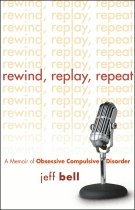Rewind, Replay, Repeat – A Memoir of Obsessive Compulsive Disorder

Selected excerpts:
“The utter stillness unnerves me at first. I imagine Doubt hiding at its edges, waiting to ambush me at just the right moment, as it’s done so many times before during the hush of a pitch black night or the sacred silence of prayer. For some reason though, I find myself feeling especially bold. I decide to go for it, to climb inside the silence, to see where it takes me.
Breathe in. Let God. Breathe out. Let go. Breathe in. Let God. Breathe out. Let go.
This is the way all my books say to do it.
Breathe in. Let God. Breathe out. Let go.
A deep blue spot takes form in the center of my mind’s eye. It grows and grows in pulsating waves. I try to focus my attention on it and block out everything else.
Breathe in. Let God. Breathe out. Let go.
Soon there is just blue and the sound of my breaths. No what-if’s to ponder. No tapes to play. No OCD monsters of any kind to feed. No words to describe the bliss of this freedom.
Seconds pass, or are they hours?
And then I get it: This is the now. The present. That infinite slice of time wedged between the past and the future.
It is the place of unlimited, unfathomable possibility, and because of this, it is the one place Doubt cannot exist.
Suddenly everything begins to make sense. For five interminable years from hell, my nemesis has steered me clear of each and every precious moment of my present, feeding me one compelling cause after another to obsess about my future while compulsively reviewing tapes of my past.” (pp. 196 – 197)
“Release, for me, is also very much about letting go of the past and the future, maybe the toughest challenge for OC’s or anyone else struggling with uncertainty. Director Doubt wants me to obsess over past mistakes and what horrific things they’ll mean for the future. Only through release can I attempt to find peace in the present. Sometimes it takes a bolt of lightning (literally, as I found in Missouri) to snap us back to the present, but with meditation and other exercises, mindful awareness of the present can also be learned. It’s taken me all these years to put this together, but I’m now convinced that the real reason radio studios have always been such safe havens for me is that because, in them, I have no choice but to focus on the moment. There’s simply no option other than to give my full attention to what I’m doing live on the air.” (pp. 331 – 332)
© 2007 Jeff Bell
Order this book online at Amazon
Reviews posted:
Paul –
Jeff is a member of the Buddhist Recovery Network’s Advisory Council, and as his credentials paragraph states on the site, this book details “his recovery from severe OCD through a combination of traditional cognitive-behavioral therapy and applied belief/mindfulness practices.” He speaks on behalf of a number of mental health organizations, and makes his living as radio news anchor in San Francisco.
I have never encountered anything before in the OCD literature that is so beautifully written. It is a creative, artistic triumph. I am very interested in his descriptions of mindfulness, stillness, focus on the breath, focus on the moment, meditation etc (eg pages 197 and 332 above).
The only element that is likely to be controversial for some, is Jeff’s attempt to break down the stigma of medication on an ongoing basis for severe OCD. He started out very much against medication, but ended up believing that medication was an effective tool that helped him gain control of his life. I guess he can only speak for his own experience, and what worked for him.
There is a slightly exhausting quality to the narration, particularly at the beginning, but this is because he is trying to capture the experience of an OCD sufferer.
Most recovery authors aspire to marry humour and personal insight, but some of Jeff’s flashes of insight are so wonderful, and so beautifully written, he has created something very rare. I think I have only encountered writing of this style and calibre once before, in Nick Hornby’s Fever Pitch (which is completely unrelated to mental illness, unless you consider supporting the Arsenal football club a type of mental illness).
If you suffer from OCD, I strongly recommend this book.
